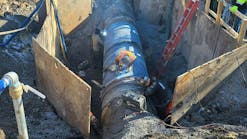MINNEAPOLIS, MINN., FEB. 22, 2016 -- Conwed, the leading plastic netting manufacturer in the world, provided its feed spacers for a water research study that attempts to identify an alternative strategy for developing and testing of feed spacers by numerical modeling, three-dimensional (3D) printing of feed spacers and experimental membrane fouling simulator (MFS) studies. The study titled “Development and characterization of 3D-printed feed spacers for spiral wound membrane systems” and published by Elsevier — Water Research 91 (2016) 55-67 — is one example of the reverse osmosis (RO) efforts in which Conwed has collaborated with industry researchers and professionals to expand knowledge about RO feed spacers and their impact on biofouling, membrane damage and pressure drop.
Conwed manufactures a full line of RO feed spacers for diverse filtration systems. As the water desalination industry continues to grow — propelled by the dramatic need to provide more people around the world with drinkable water — desalination material suppliers, such as Conwed, are investing heavily into identifying ways to directly impact water desalination systems. As a filtration industry innovator, Conwed pioneered the use of 3D printed feed spacers, experimenting with new technologies and alternatives to manufacture feed spacers in small scale settings. These 3D printing efforts also helped Conwed accelerate the testing and trial process of newer designs and configurations that imitated real conditions from actual water desalination facilities. Since then, Conwed has made significant efforts in working with university and independent researchers to unveil potential improvements feed spacers could have on biofouling, membrane damage and pressure drop. “Our R&D and engineering teams have explored 3D technologies for a few years now. We pioneered the use of 3D technology in feed spacers to test new geometries and designs because we knew it would be an alternative to speed up the process from design creation to actual performance testing replicating live conditions in real RO systems”, said Ivan Soltero, Sr. Strategic Marketing Manager at Conwed. “We are proactively looking for alternatives to impact water desalination systems from a feed spacer perspective”.
The study “Development and characterization of 3D-printed feed spacers for spiral wound membrane systems”, offers a comparison of 3D printed and commercial feed spacers with identical and different geometries. Conwed observed in other previous testing efforts and trials, a performance difference when feed spacer thickness, angles and chemical formulations were modified. This joint research also covers some numerical modeling and experimental readings on hydraulics and biofouling. The researchers mention that a combination of numerical modeling of feed spacers and exploratory testing of 3D printed feed spacers is a promising strategy to develop advanced feed spacers targeting the reduction of biofilm formation on membrane performance and improving cleanability of spiral-wound nanofiltration (NF) and reverse osmosis (RO). “These types of research studies help us understand how our next-generation feed spacers could impact biofouling, membrane damage and pressure drop, the three main challenges in every RO system. We truly believe the next wave of innovation in the desalination industry will come from the feed spacer”, said Soltero.
To know more about Conwed and its reverse osmosis efforts visit http://www.conwedplastics.com/ro
About CONWED
Conwed is the leading plastic netting manufacturer in the world. Conwed manufactures extruded, oriented and knitted netting with unique customization capabilities. Headquartered in Minneapolis, Minnesota, Conwed has five manufacturing locations on two continents and a global distribution network.


